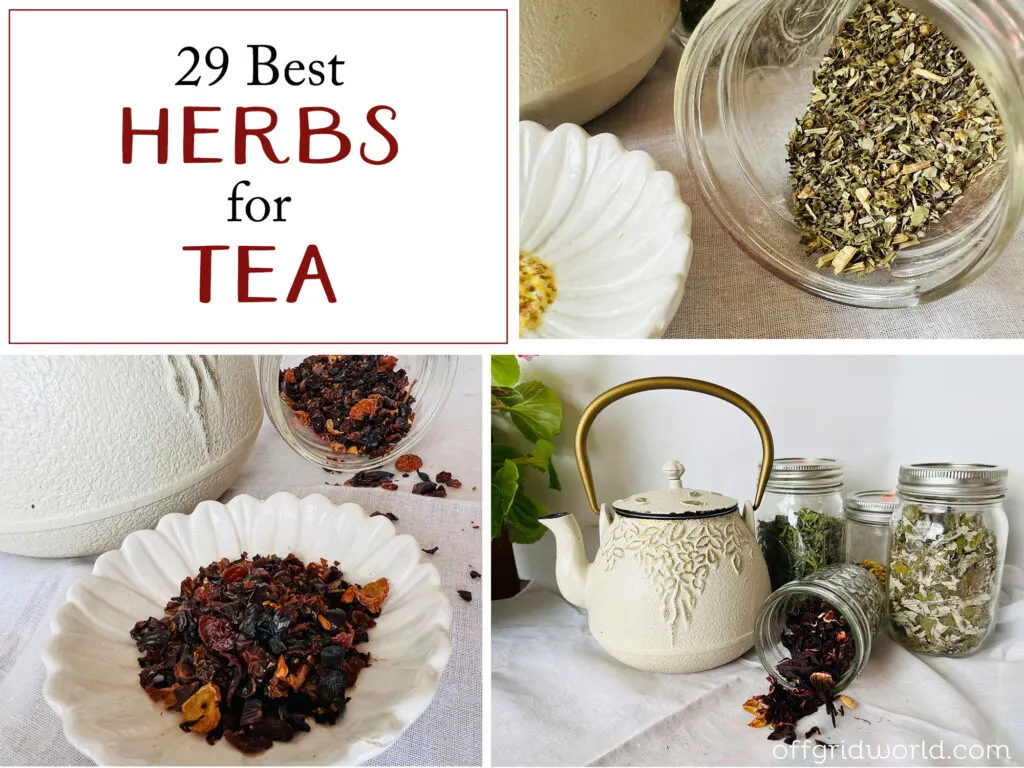Hey there, tea enthusiasts and botanical buddies! Gather around the kettle because today, we’re diving into the enchanting world of herbal teas.
If you thought tea time was just for British royalty, think again. We’re about to embark on a flavorful journey that proves herbal tea blends are the unsung heroes of the beverage realm, perfect for anyone looking to sip on something special.
Now, before you say, “It’s just leaves in water. What’s the big deal?” let me tell you, these aren’t your regular garden weeds.
Herbal teas are versatile, bursting with flavor, and packed with benefits that can make you rethink your whole beverage situation. From soothing a troubled tummy to calming a frazzled mind, there’s an herb for almost every ailment.
But what is this mystical brew we call herbal tea, and why does it deserve a spot in your mug? It’s not just about ditching caffeine or finding an alternative to water. We’re talking about a tradition steeped in history, a natural remedy passed down through generations, and a daily ritual that can transform your health and happiness.
So, whether you’re a tea-toting veteran or someone who can’t tell chamomile from chai, pull up a chair.
We’ve got over 35 most popular herbs to explore, each with its own tale to tell and benefits to bestow. Many of these herbs can easily be grown in your garden. By the end of this list, you might just find your new favorite cuppa.
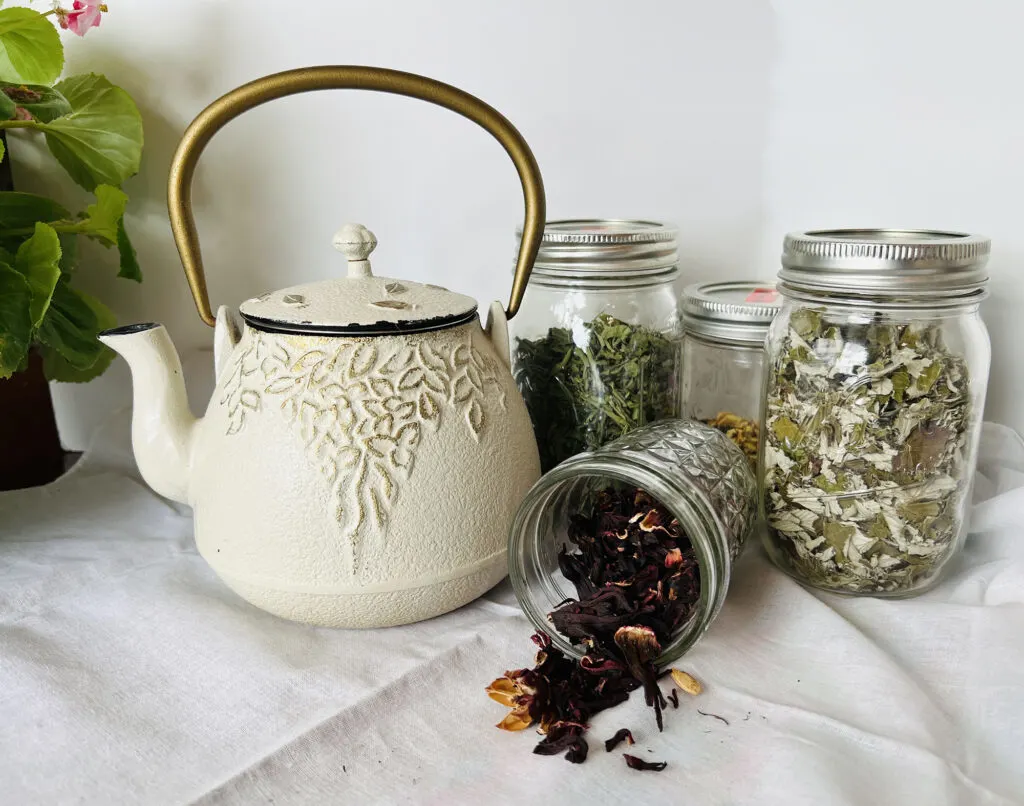
What Exactly Is Herbal Tea?
First things first: despite its name, herbal tea isn’t technically tea. I know, mind-blowing, right? True tea comes from the Camellia sinensis plant (think green, white, black tea, and oolong).
Herbal tea, on the other hand, is more like a botanical cocktail made from pretty much anything else – flowers, leaves, roots, bark, you name it. If it comes from the earth and isn’t the tea plant, into the pot it goes!
Why Herbal Tea?
Now, why would one venture into the realm of herbal tea, you ask? Oh, let me count the ways!
Aside from being a delightful sensory experience (seriously, some of these brews smell like a dream), herbal teas offer a kaleidoscope of other benefits.
We’re talking stress reduction, digestive aid, immune support, and even a good night’s sleep. Plus, they’re naturally caffeine-free, so you can guzzle down that mug of peppermint bliss without turning into a night owl.
Brewing the Perfect Cup
Here comes the fun part – brewing! While tossing a tea bag into hot water might seem straightforward, there’s an art to unlocking the full potential of your herbal blend.
- Water Quality: Just like a fine wine, the quality of your water matters. Soft, filtered, cold water will let the delicious flavors shine.
- Temperature: Boiling water can be a bit harsh on delicate fresh herbs. Aim for just off the boil, around 208°F, to coax out those flavors gently. You can also preheat your teapot so that the temperature doesn’t drop too fast.
- Steeping Time: Patience, young grasshopper. Give your herbs time to mingle and infuse. Five to ten minutes should do the trick, but feel free to experiment – every herb is unique.
- To Cover or Not to Cover: To trap those aromatic essential oils and flavors, cover your cup or pot while steeping. You wouldn’t want all the good stuff to escape with the steam, would you?
- Experiment: The beauty of herbal tea lies in experimentation. Mix and match herbs to find your signature brew. Who knows, you might just stumble upon the next big thing in tea!
So, there you have it – the basics of herbal tea. As we dive deeper into our list of 35+ herbs, keep these tips in your pocket. They’ll serve you well on this leafy journey.
Now, get ready for your cups, friends! It’s time to steep our way through the wonderful world of herbal teas.
The Ultimate Best Herbal Teas
1. Ashwagandha Tea
This ancient herb, with roots in Ayurvedic tradition that stretches back millennia, is like the wise old sage of the plant world. It offers its wisdom in the form of stress relief and a boost in vitality.
Ashwagandha, often dubbed the “Indian ginseng,” has an earthy, a bit nutty taste, and with a whisper of the exotic that might have you wondering if you’re sipping tea or embarking on a spiritual journey.
My personal tip: if you are not a fan of the taste, mix ashwagandha tea with a dash of honey or blend it into your favorite smoothie, and you’ve got yourself all the benefits at no taste cost.
2. Barley Tea
Often flying under the radar, barley tea is like that low-key friend who’s surprisingly full of stories once you get them talking.
Originating from East Asia, where it’s been cooling off summers and warming up winters for centuries, this brew has a toasty, slightly nutty flavor with a whisper of smokiness, a comforting aroma that fills your kitchen like a warm hug from a wise old tree.
It’s caffeine-free, making it the perfect nightcap or a cozy companion for those long, introspective evenings.
3. Butterfly Pea Flower Tea
This stunning brew hails from Southeast Asia and has been turning heads and dazzling tea cups for generations. It’s like the chameleon of teas – add a splash of lemon and watch it shift from a cool, serene blue to a vibrant, party-ready purple.
Why? It’s all about the pH levels, but let’s not get too bogged down in the details.
What you really need to know is that it’s packed with goodies for your brain, can put you in a better mood, and is basically a superhero when it comes to antioxidants.
Taste-wise, think of it as the intriguing cousin of green tea – earthy, with a hint of woody sweetness that’s hard to pin down but easy to love. So, if you’re looking to jazz up your tea routine, butterfly pea flower tea is your ticket to the show.
4. Chamomile Tea
Ah, chamomile tea – the ancient elixir of calm that has been soothing frazzled nerves since the time of the Pharaohs. Egyptians revered chamomile for its healing properties, dedicating it to their gods, believing it was the sun god Ra’s gift to humanity.
Fast-forward a few millennia, and this humble herb hasn’t lost an ounce of its charm. Chamomile tea, with its delicate apple-like aroma and a golden hue reminiscent of the first light at dawn, is like receiving a warm, gentle hug for your insides.
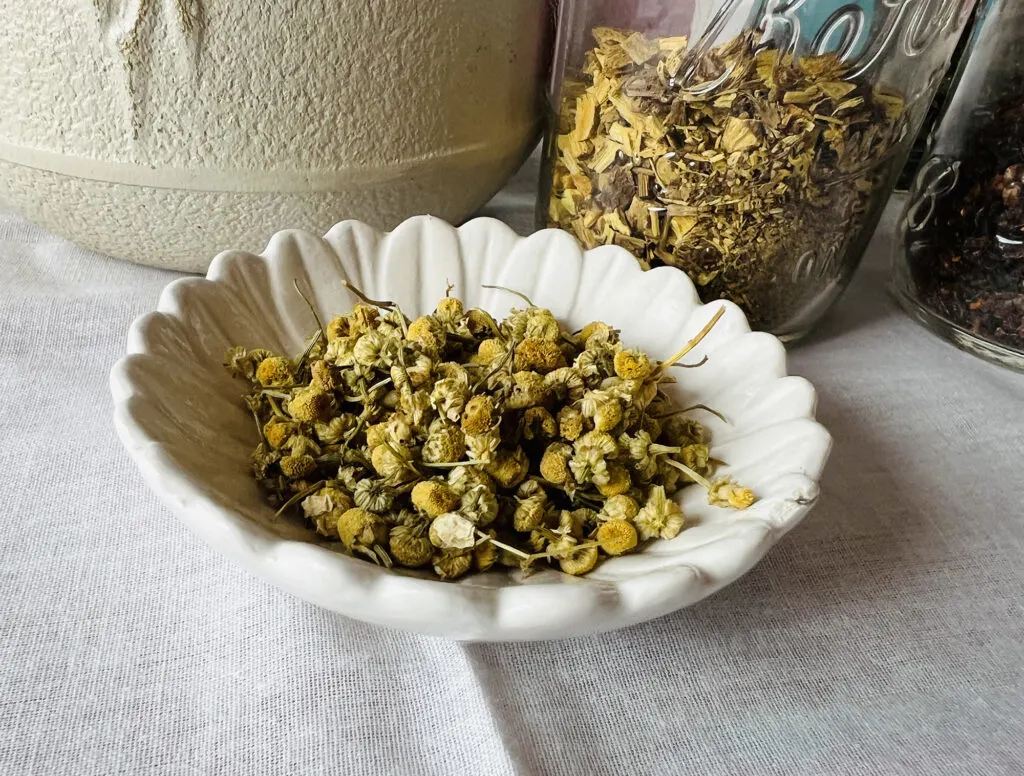
5. Cinnamon Tea
This spice, once more valuable than gold, has journeyed from ancient Egyptian tombs to becoming the heartwarming hero of your tea collection.
Not just a holiday favorite, cinnamon tea is a year-round champion with its sweet, spicy kick that can pep up your palate faster than you can say “more, please!”
6. Dandelion Tea
Dandelion is often dismissed as just a pesky weed by the uninitiated. But let’s set the record straight: this little plant is like the Clark Kent of your backyard, modest until it reveals its superpowers.
Cultivated since the 10th century and used by various cultures for its health benefits, dandelion tea is the comeback story we all root for. With a slightly bitter yet intriguingly sweet taste, it’s the underdog that surprises you, kind of like that indie movie you didn’t expect to love.
And the aroma? Earthy, with a hint of something like the promise of spring after a long winter.
7. Echinacea Tea
Originating from the North American plains, where it was a go-to remedy for the Indigenous peoples long before it became well-known, echinacea is the old soul in the garden with tales of healing and resilience.
Echinacea tea is earthy, with a hint of something wild and untamed, much like the prairies it comes from. It’s a complex character: slightly bitter, somewhat grassy, but ultimately warming and reassuring.
8. Elderberry Flower Tea
Elderberry is a delicate flower that could easily be overlooked in the wild, yet it packs a punch worthy of folklore and ancient medicine cabinets alike.
Elderberry flower tea doesn’t just taste good; its flavor is a light, slightly sweet, and floral symphony with a hint of earthiness, kind of like a spring morning in a cup, but with superpowers.
9. Eucalyptus Tea
This aromatic marvel doesn’t just hail from the land Down Under for nothing; it brings with it a breath of fresh air from the Australian wilderness, where it’s been clearing sinuses and soothing souls long before spa playlists were a thing.
Eucalyptus tea is like a cool breeze on a hot day. Its minty-fresh flavor dances on your palate, and its camphorous aroma can turn your living room into an open eucalyptus grove.
It’s the go-to for when you’re feeling under the weather or when your body is sending SOS signals for some TLC.
10. Ginger Tea
This rooty rascal has a history that stretches back thousands of years. For its medicinal properties, it was the toast of ancient China and India.
This aromatic infusion offers a zesty kick and a tantalizing fragrance. Known for its comforting qualities, ginger tea delights with a spicy note, making it an important addition to your herbal tea repertoire.
So, if you’re craving a cup of something with a lot of character, ginger tea might just be your new best friend.
11. Ginkgo Tea
This ancient brew has been playing the long game in the wellness world. Imagine a tree so old dinosaurs used to snack on its leaves—yes, we’re talking about the ginkgo biloba. It is the living fossil that decided to stick around and bless us with its brain-boosting powers.
This tea is known for sharpening the mind, enhancing cognitive function, and maybe even making you witty enough to win your next trivia night. Ginkgo tea’s flavor is subtly grassy with a hint of sweetness, a gentle reminder of nature’s timeless wisdom.
12. Hibiscus Tea
This showy flower isn’t just about good looks; it’s got history and health chops that could make even the most seasoned tea leaves blush.
Originating from ancient Egypt, where pharaohs sipped on this ruby-red elixir to cool down and keep their cool, hibiscus tea is like the cool aunt who’s traveled the world and knows a thing or two about living well.
Taste-wise, think of a tart berry with a lemony flavor – that’s your sip of hibiscus tea. It has a tangy and sweet flavor, and it’s got a zing that’ll wake up your taste buds and maybe even your aspirations.
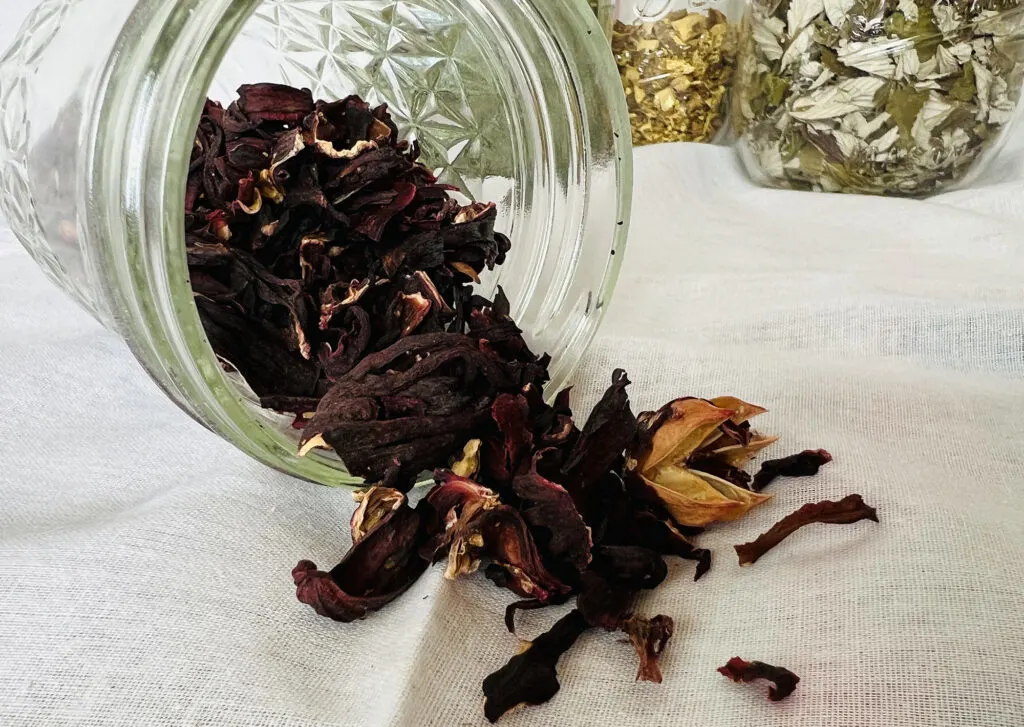
13. Jasmine Tea
Tea with jasmine is a centuries-old tradition that began in China, where skilled tea masters had the brilliant idea to infuse green tea with the scent of jasmine blossoms.
What they brewed up was way more than just a drink—it’s a whole vibe. Imagine wrapping yourself in an intoxicating cloud of aroma that’s so delightfully sweet that it practically gives you a hug with every sip. Jasmine tea isn’t just tasty; it’s like a spa day for your soul, known for its chill-out powers.
14. Kava Tea
Kava tea, with its roots deeply planted in the rich traditions of the Pacific Islands, is the herbal world’s answer to a chill pill.
Now, if you’re trying it for the first time, brace yourself.
Kava’s taste is peppery and bold—it’s definitely not your average tea. But give it a chance, and you’ll find there’s something about its complex flavor and the way it gently numbs your tongue that turns sipping it into a whole vibe.
15. Lavender Tea
Sipping on lavandula angustifolia tea is like getting a warm hug from nature itself.
It’s not just the delicate floral scent or that hint of sweetness that wins hearts; it’s also the stories this brew carries. For ages, people have turned to lavender to quiet their minds, ease their souls, and coax themselves into dreamland.
There’s something special about lavender that goes beyond its taste and aroma—it’s been a symbol of all things pure, peaceful, and heartfelt for as long as anyone can remember.
16. Lemon Balm Tea
Lemon balm tea is the cheerful, sunlit room of the herbal tea world, where every sip feels like a burst of summer, no matter the season. The name itself tells about its most enchanting trait: a lemony scent and flavor that’s both uplifting and soothing.
This leafy delight traces back to the heart of the Mediterranean and was used by the Greeks over 2,000 years ago for its superlative qualities. It has been a beacon of calm and joy through the ages.
17. Lemongrass Tea
Originating from the tropical parts of Asia and Africa, lemongrass has been the go-to for folks looking to add a bit of pep to their step, dating way back.
It’s not just a pretty smell, though. Lemongrass tea is uplifting, aids in digestion, and even has a few tricks up its sleeve for keeping your skin looking smooth.
Flavor-wise, think of it as the life of the party in your tea collection: bright, refreshing, with a lemony kick that’s bold but never too sharp. It’s the perfect pick-me-up that whispers rather than shouts, “Hey, let’s get this day rolling.”
18. Licorice Root Tea
This little root packs a punch, both in flavor and benefits. Originating from the lands where history reads like an epic novel, licorice has been a staple in ancient medicine cabinets from Egypt to China, earning its stripes as a natural remedy heavyweight.
Imagine sipping on something that tastes like sweet, earthy candy but without the guilt trip because, surprise, it’s actually good for you! And if you’re thinking it’ll taste like chewing on a licorice stick from the candy store, think again. It’s smoother, subtler, and, dare I say, sophisticated.
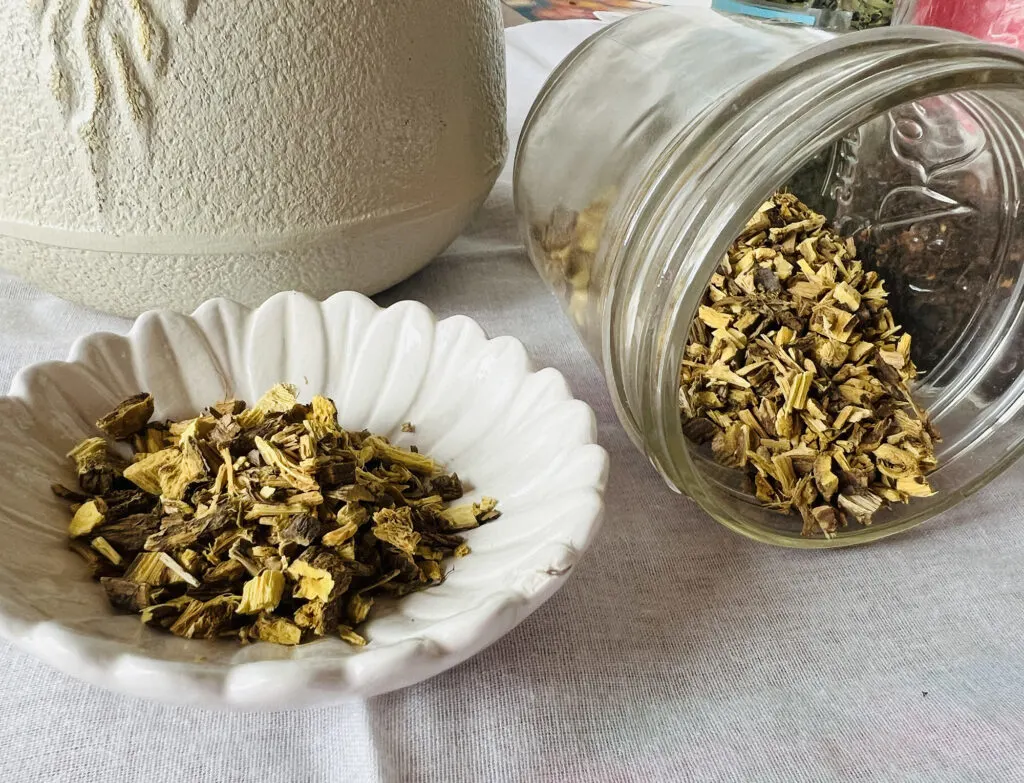
19. Passionflower Tea
Passionflower tea is the intriguingly named brew that sounds more like a love potion than an herbal infusion.
This tea doesn’t just rest on the laurels of its enchanting name; it’s got a backstory and benefits that could fill a book. Historically, Native Americans were the first to uncover the magic of the passion flower, using it for its calming properties.
20. Peppermint Tea
Peppermint tea is the cool, minty friend with a history as rich as its flavor. Hailing from the crossbreeding party of watermint and spearmint in Europe and the Middle East, this zesty character has been making waves in teacups since ancient times.
The Romans were onto something when they crowned their guests with peppermint wreaths, aiming for both high spirits and good conversation. Fast forward to today, and peppermint tea remains a go-to for its vibrant taste and scent that can snap you out of the dullest daydream.
Beyond its sensory experience, peppermint tea is a great choice for a calming hand after a hectic day.
21. Raspberry Leaf Tea
This herbal hero isn’t new on the block; it’s been strutting its stuff in the herbal world since your great-great-grandma’s time, revered for making things a bit smoother, especially for the ladies.
But hey, don’t let that niche fame fool you – raspberry leaf tea is a crowd-pleaser with a taste that’s subtly reminiscent of the fruity tea but earthier like you’re sipping on a secret from the garden itself.
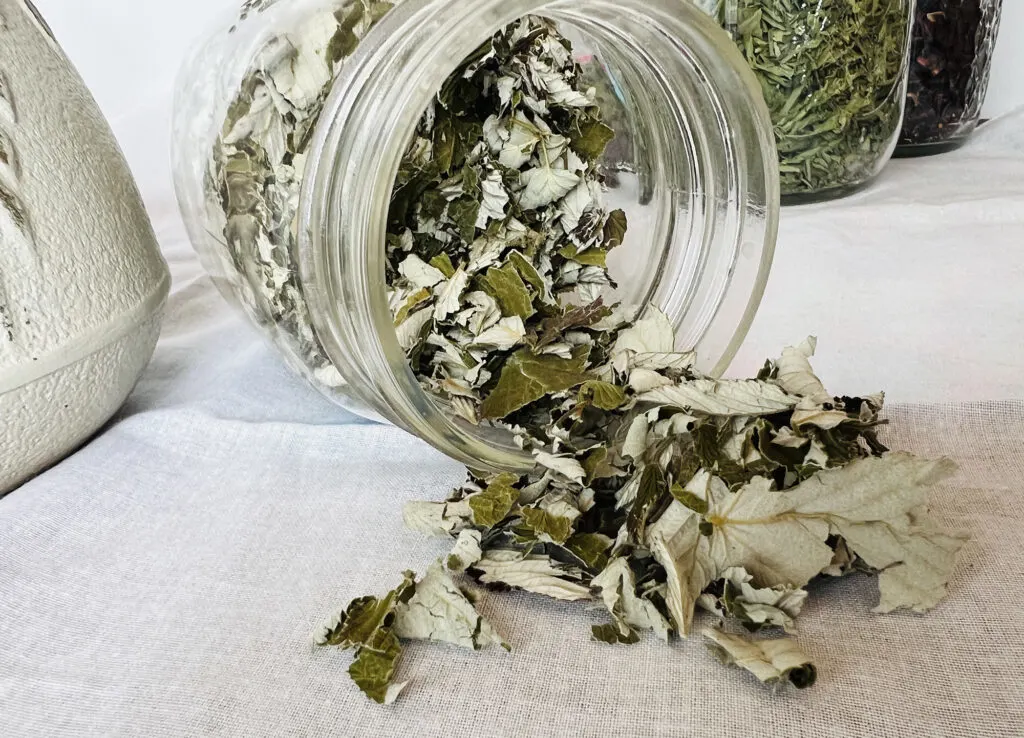
22. Rooibos Tea
This herbal delight, often affectionately dubbed as ‘red bush tea,’ carries within its leaves a tale as rich and vibrant as its color. Originating from the Cederberg region in South Africa, rooibos has woven its way through centuries.
It was initially harvested by the indigenous Khoisan people, who believed in its potent healing properties. These fine folks would climb the mountains, gather the leaves, and leave them to ferment in the sun, transforming them into the deep red treasure we savor today.
Fast forward to the modern era, and rooibos has danced its way into the hearts of tea enthusiasts worldwide, not just for its unique earthy vanilla flavor but also for its myriad of health benefits.
23. Rose Tea
Rose herbal tea – the garden’s blushing beauty turned cupped delight. Its taste is subtly sweet, with a graceful hint of tartness, whispering tales of love potions and royal gardens every time you take a sip.
So, next time you’re feeling fancy or just need a floral hug in a mug, let rose tea be your go-to.
24. Rose Hip Tea
Rose hip tea has been jazzing up taste buds way before your grandma’s grandma decided it was cool. This little gem is basically the fruit of the rose plant, hiding in the shadow of its showier flower relatives but oh-so full of surprises.
Back in the day, when fresh produce was scarce, people leaned on rose hips for their vitamin C kick, turning this tea into a real superfood.
Rose hip tea has a bold, tart flavor and a vibrant color that screams “Instagram me!”. Plus, it’s not just about taste; this tea is a powerhouse of benefits. Thanks to all that vitamin C, it’s great for giving your skin a glow-up and your immune system support.
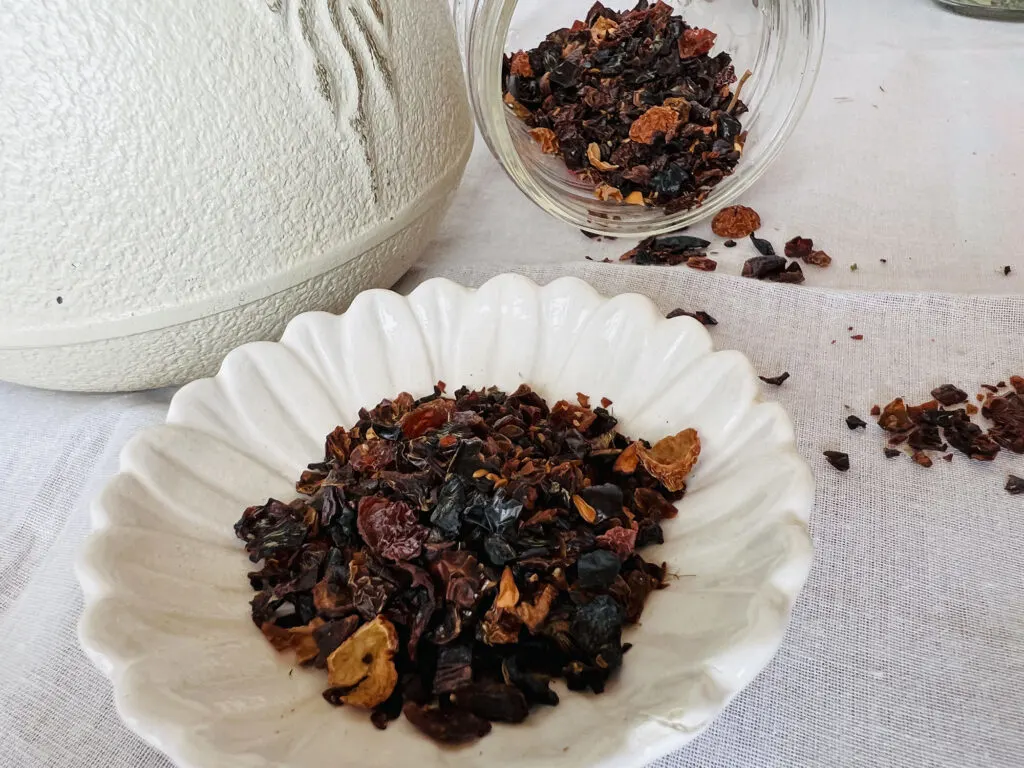
25. Rosemary Tea
Now, let’s have a chat about rosemary herbal tea. A piney aroma with a hint of lemon, a flavor bold enough to wake up your senses and gentle enough to soothe your soul.
Drinking rosemary tea is like walking through a Mediterranean garden on a crisp morning, invigorating and calming all at once. And let’s not forget its rep as a digestive aid, because even plants know the importance of a happy gut.
26. Sage Tea
The ancient Romans regarded sage tea so highly for its health benefits that they had a saying, “Why should a man die whilst sage grows in his garden?”
The taste of this member of the mint family is robust, a bit peppery, with a cooling, almost minty finish that surprises you like finding a forgotten twenty in your pocket. As for the smell, imagine a pine forest meets an herb garden at dawn – earthy, fresh, and invigorating.
27. Tulsi (Holy Basil) Tea
Meet Tulsi tea, also known as Holy Basil – but don’t let the “holy” part scare you, it’s as down-to-earth as your neighbor growing tomatoes with a green thumb. It is a blend that’s peppery, with a hint of clove, and a subtle, minty freshness.
Tulsi doesn’t just bring a cup of tea; it brings an experience infused with a history of being revered in Ayurveda as an adaptogenic herb, which is a fancy way of saying it helps your body chill out and cope with stress.
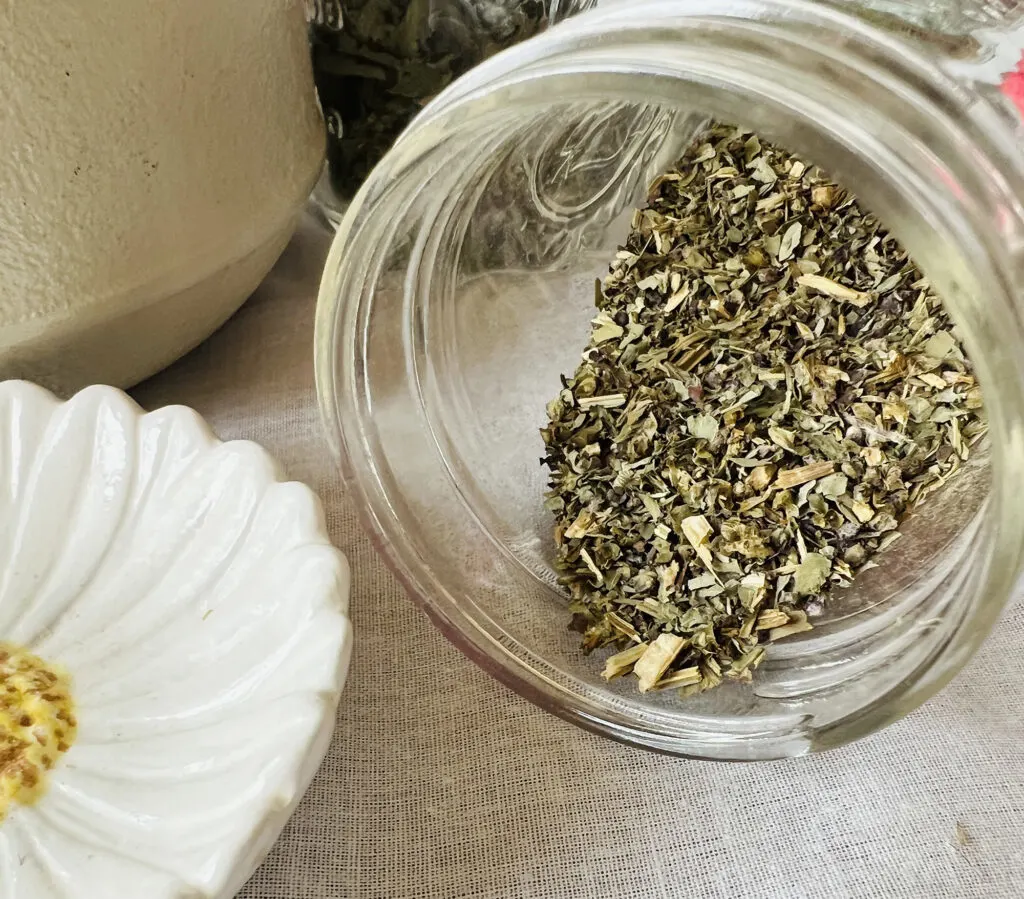
28. Turmeric Tea
Turmeric tea is the golden child of herbal infusions that’s been lighting up lives longer than your favorite Instagram filter. Turmeric’s taste has an earthy base with peppery highs and a slightly bitter edge.
This ancient root, a close relative to ginger, has been the go-to spice in Indian Ayurvedic practices for thousands of years, not just for its bold color and flavor but for its impressive list of health benefits (for instance, antioxidant and anti-inflammatory properties).
29. Valerian Tea
Valerian tea is like that friend who tells the best bedtime stories. Its tales stretch back to the ancient worlds of Greece and Rome, whispering secrets of sleep and calm.
They call it “nature’s Valium,” and for good reason. This rooty brew has become a trusted companion for anyone who’s ever tossed and turned at night, from students under a mountain of stress to anyone seeking tranquility in dreamland.
Now, I’ll be straight with you: valerian tea isn’t going to win any awards for its taste—it’s earthy, a touch bitter, and unique. But here’s the thing – it’s not really about the flavor. It’s a great way to make you feel better afterward.
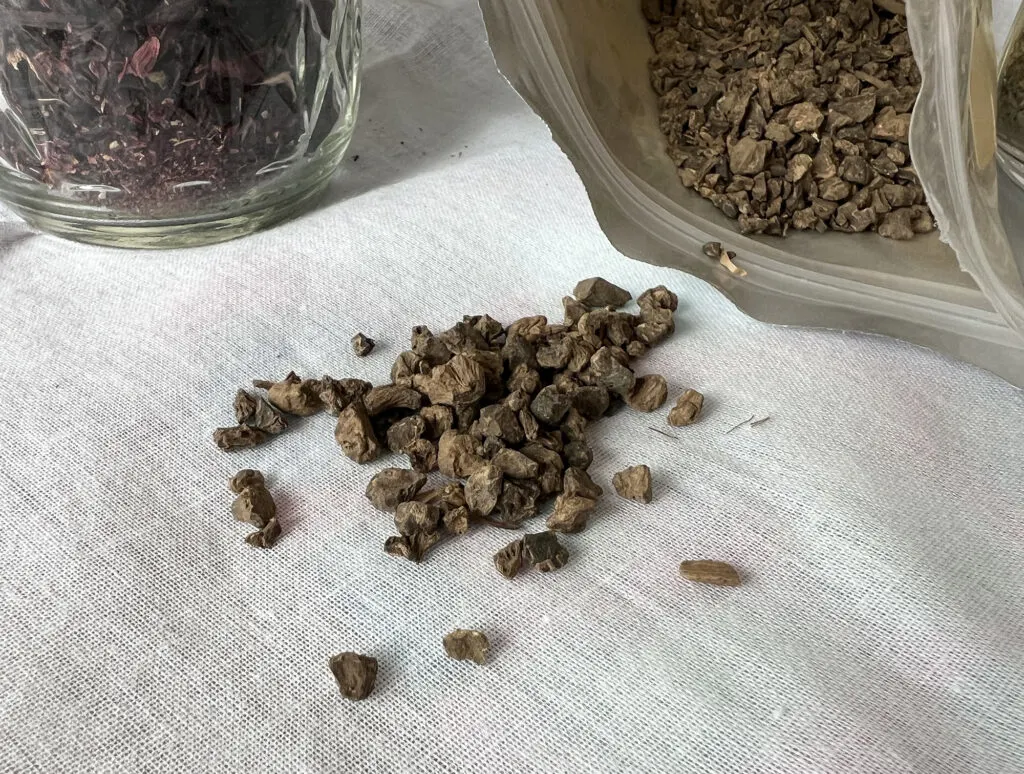
30. Yerba Mate Tea
Yerba mate is traditionally shared from a single gourd and bombilla (that’s a fancy straw), making it the ultimate icebreaker. Flavor-wise, it’s like a walk through the woods: earthy, robust, with hints of bitter and sweet playing tag on your taste buds.
It’s complex, intriguing, and a bit of an acquired taste, but once you’re in, you’re in the club for life. Yerba mate has depth; it fights oxidative stress and is rich in nutrients that could put some multivitamins to shame.
Final Thoughts
On a final note, our adventure into the magical realm of wonderful herbal teas has been an absolute feast for the senses.
Herbal teas are amazing if you’re hunting for that perfect balance of taste and wellness benefits or you’re simply on the lookout for something special for your daily routine.
However, if you find yourself still pondering over which herbal tea might best suit your taste or wellness needs, why not let the stars guide you?
For those seeking a touch more inspiration or a fun twist on choosing their next brew, head over to this post about herbal teas for different zodiac signs. You will discover how your astrological sign can align with the natural qualities of herbal teas, offering a personalized path to finding your ideal, soothing companion.
